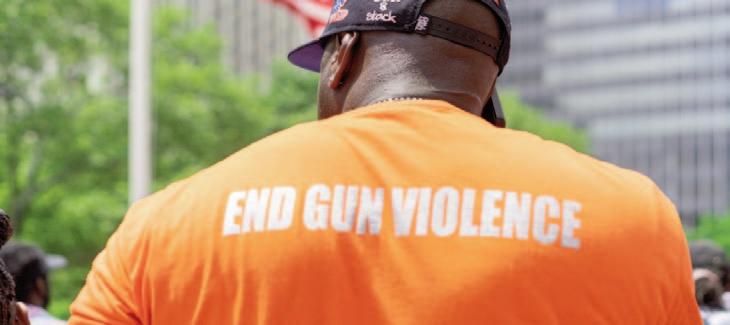
4 minute read
PartyRentals for All


Advertisement
deaths, and growing mental health needs for our young people. Therefore, a comprehensive mental health plan for New York City is more critical today than ever before,” said Deputy Mayor for Health and Human Services Anne WilliamsIsom. “This plan centers people, care, and compassion at the core of each of its strategies, and focuses on those who have been previously left behind. From child and family mental health to those struggling with substance use issues to those with more severe conditions needing specialized supports, it sets forth new and sustainable ways to support every New Yorker who needs it.”
“This plan represents the city’s commitment to tackling the second pandemic of mental health needs in the wake of COVID-19, and it outlines a vision and a framework of a culture-shifting response for New York City,” said DOHMH Commissioner Dr. Vasan. “We must treat mental health as foundational to our society’s collective future, the same way we would our economy or the environment. We must act intentionally and ambitiously now, to shore up the system’s foundations and to innovate. By grounding this strategy in public health, focusing on populations with the greatest needs, as well as by working across levels of government and across stakeholders groups, we are showing how to bring all hands on deck to transform our mental health system, to save lives, prevent suffering and improve quality to life.”
Improving Child and Family Mental Health
Increasing access to mental health care for youth and their families and improving access to mental health care that is timely, culturally responsive, accessible, and affordable is critical to New York’s overall wellbeing.
While few models of a holistic youth mental health system exist, the long-term benefits of early intervention are potentially greater than with any other group. The need is also becoming clearer, with rates of depression among youth rising. As announced in Mayor Adams’ State of the City address in January, the city will invest $12 million to launch an expansive telehealth program for New York City high school aged teens, connecting them with mental health care. The city will also launch suicide prevention pilot programming at NYC Health + Hospitals for youth entering emergency departments for suicide attempts and communitybased suicide prevention programming to specifically serve Black and Brown youth.
To further understand risk factors to a young person’s mental health better, the city will also bring together youth, families, and community partners to assess the impacts of social media on youth and develop strategies to address potential harms.
Ambitious Health Agenda
continued from page 18
Addressing the Drug Overdose Crisis
The year 2021 was the deadliest year on record for overdose deaths in New York City, with racial and geographic disparities worsening — reflecting trends of the national crisis. To tackle the opioid epidemic, the mental health agenda outlines how the city will expand access to highquality harm reduction services and sets a goal of reducing overdose deaths by 15 percent by 2025.
To meet this goal, Mayor Adams announced the city will expand non-fatal overdose response efforts to at least three additional hospital emergency departments and strengthen the 14 syringe service providers into a network of Harm Reduction Hubs with comprehensive services like a place to rest, addiction services, and medical and mental health services. The city will also expand drugchecking services and implement at least four Public Health Vending Machines that dispense naloxone to increase access in neighborhoods with high rates of overdoses — the first of its kind in New York City. New York will additionally increase support for children, families, and communities affected by the overdose crisis and work to reduce the number of people who develop problematic substance use.
Finally, the city will explore opportunities to expand overdose prevention centers (OPCs) to areas of the city with the highest rates of overdose death, continue to support the two existing OPCs with the goal of allowing them to operate 24 hours per day, and also continue to advocate for legal pathways to fund and operate OPCs.
Expanding Serious Mental Illness Support

This plan focuses on connecting New Yorkers with SMI with four pillars of care: health care, housing, community, and crisis response. The city aims to double the number of connections of New Yorkers living with SMI with community-based care over the next four years, putting thousands more New Yorkers on a path to stability. As part of this effort, the city will also expand mobile treatment capacity over the next year to serve 800 more people with high service needs through Intensive Mobile Treatment (IMT) and Assertive Community Treatment (ACT). To expand housing options for people with SMI, the city will add an additional 8,000 units of supportive housing, and invest $7 million more to significantly increase Clubhouse capacity over the next four years.

The mental health agenda additionally outlines how the city will strengthen the crisis response systems, expanding the BHEARD pilot program citywide to respond to more mental health-related crises with a health-led response and adding two peers to every mobile crisis team to divert people in crisis from unnecessary hospitalizations. Finally, the city will work in partnership with state partners to develop a streamlined referral system to care, expediting referrals from hospitals, jails, and shelters.
“As New York’s largest provider of behavioral health services, NYC Health + Hospitals welcomes this historic plan,” said NYC Health + Hospitals President and CEO Mitchell Katz, MD. “Meeting the behavioral health needs of all New Yorkers has long been core to our mission, and this thoughtful strategy will bring critical new momentum to this work at a pivotal moment for our city. We thank the mayor for moving boldly and making this issue a priority.”
“This is a remarkable moment to serve as a mental health provider and leader in New York City,” said NYC Health + Hospitals System Chief of Behavioral Health and Co-Deputy Chief Medical Officer Omar Fattal, MD, MPH. “This plan is a significant leap forward for our city’s mental health system. It will deliver a major boost to our ongoing work, provide our hospitals with much-needed tools, and connect our patients to muchneeded services. We look forward to coordinating with other agencies, community leaders, and partners to ensure its success.”
“We are proud to be a part of the mayor’s comprehensive mental health plan. This plan is essential in closing disparity gaps in mental health care” said Mayor’s Office of Community Mental Health (OCMH) Director Eva Wong. “We know that high-quality, compassionate, health-led, emergency mental health care, such as that provided by OCMH’s B-HEARD, is crucial to connecting New Yorkers to community-based support and longer-term care, which is why the citywide expansion of B-HEARD is needed and applauded. In service of this bold plan, OCMH will continue to partner across city agencies and with communities to strengthen protective factors and resilience as we work together to improve the health and wellbeing of all New Yorkers.”l










